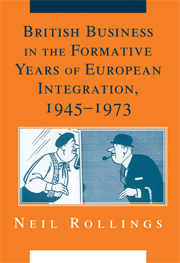Conclusion
Published online by Cambridge University Press: 02 December 2009
Summary
In one of the most oft-cited metaphors for describing the study of European integration, Donald Puchala used the well-known story of the blind men and the elephant. Each blind man touched a different part of the elephant and reached their own conclusions about what the elephant looked like; all of course wrong. All describe different and important features of what constitutes an elephant without being able to grasp the whole. The study of the history of European integration has been slightly different. For many years the field has been dominated by diplomatic historians, all of whom it could be said pored over the same part of an elephant and ignored the rest of the animal. It is significant in this respect that “Despite its growth in recent years, European integration history is still a relatively small research field which does not yet play a major role in contemporary history more generally and is not particularly well connected to social science research on the EU.” The most obvious exception to this criticism would be Alan Milward whose works have been more widely influential but whose constant clarion call has been for histories of European integration to move beyond the realms of diplomatic history. This book has responded to that call: Readers may dispute how important the part of the elephant analyzed here is, but it would be hard for them to disagree that it is a part of the elephant and a part about which remarkably little is known.
- Type
- Chapter
- Information
- Publisher: Cambridge University PressPrint publication year: 2007

